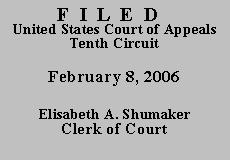

| UNITED STATES OF AMERICA, |
|
| v. | |
| JESUS TAPIA-CARRASCO, |
Tapia-Carrasco promised a confidential informant that his son-in-law, Codefendant Esteban Sanchez-Diaz, could provide him with several kilograms of drugs. Tapia-Carrasco and Sanchez-Diaz traveled to Grand Junction, Colorado, accompanied by Tapia-Carrasco's daughter (who was Sanchez-Diaz's girlfriend) and her small children, to complete the sale.
Based on this transaction, Tapia-Carrasco and Sanchez-Diaz were charged with possession with intent to distribute, and Tapia-Carrasco pled guilty on the second day of trial. At sentencing, the district court rejected the government's argument that a two-level enhancement was appropriate under the United States Sentencing Guidelines for using the children in the offense. See USSG § 3B1.4. However, the court noted its concern that Tapia-Carrasco had brought his small grandchildren to the drug transaction. Based on these and other considerations, the court concluded that the guideline range was 41 to 51 months and imposed a sentence of 46 months.
On appeal, Tapia-Carrasco argues that the district court should have imposed a low-end, 41-month sentence. He bases this claim on the notion that a court violates Booker and the Sixth Amendment when it considers evidence that was not found by a jury or admitted in a plea agreement. Put another way, since he admitted nothing other than those facts necessary to calculate the guideline range, the district court was required to sentence him at the low end of the guideline range. Because Tapia-Carrasco did not preserve this argument below, we review it for plain error. See United States v. Gonzalez-Huerta, 403 F.3d 727, 732 (10th Cir. 2005). This means that we will only reverse if "there is (1) error, (2) that is plain, which (3) affects substantial rights, and which (4) seriously affects the fairness, integrity, or public reputation of judicial proceedings." Id.
To be sure, 18 U.S.C. § 3553(a) directs sentencing courts to "impose a sentence sufficient, but not greater than necessary" to satisfy the purposes stated therein. Even prior to Booker, judicial discretion within the guideline range was exercised in light of § 3553(a), see Gonzales-Huerta, 403 F.3d at 73536, and the Supreme Court has never suggested that this discretion is constrained by the Sixth Amendment. Booker did not modify the factors that courts should consider in exercising their discretion--rather, it stands for the proposition that punishment outside a mandatory range requires Sixth Amendment protection. 125 S. Ct. at 74852. In exercising discretion within a guideline range, courts look to a variety of factors under § 3553(a), including the defendant's background, the circumstances of the crime, and the defendant's conduct in relation to others convicted of the same crime.
Here, the district court concluded that a mid-range sentence was appropriate given the fact that Tapia-Carrasco had brought his family, including young grandchildren, to the scene of a drug transaction. This consideration was clearly appropriate under § 3553(a)(1) (directing sentencing courts to consider "the nature and circumstances of the offense"), so the district court did not err, plainly or otherwise, in imposing a midrange sentence in this case.
For these reasons, we AFFIRM the sentence below.
Entered for the Court
Timothy M. Tymkovich
Circuit Judge
*. This order is not binding precedent, except under the doctrines of law of the case, res judicata, and collateral estoppel. The court generally disfavors the citation of orders; nevertheless, an order may be cited under the terms and conditions of 10th Cir. R. 36.3.
2. After examining the briefs and the appellate record, this three-judge panel has determined unanimously that oral argument would not be of material assistance in the determination of this appeal. See Fed. R. App. P. 34(a); 10th Cir. R. 34.1(G). The cause is therefore ordered submitted without oral argument.